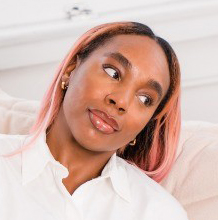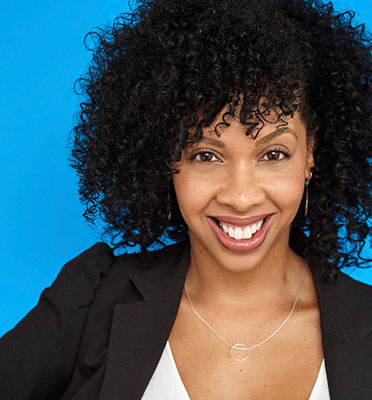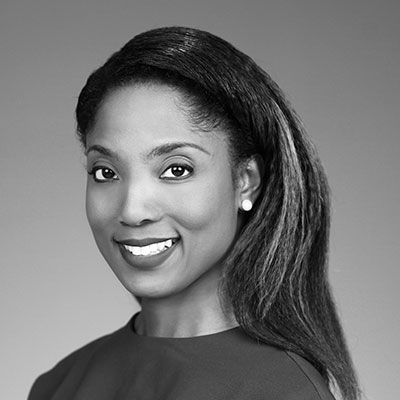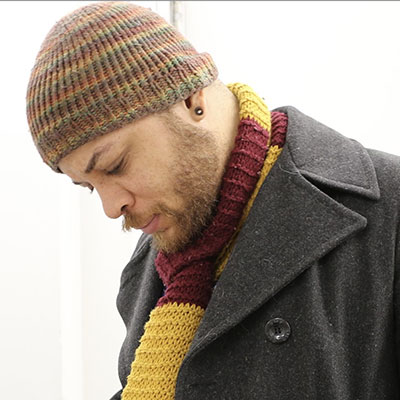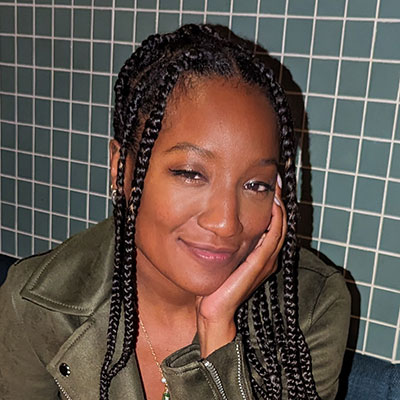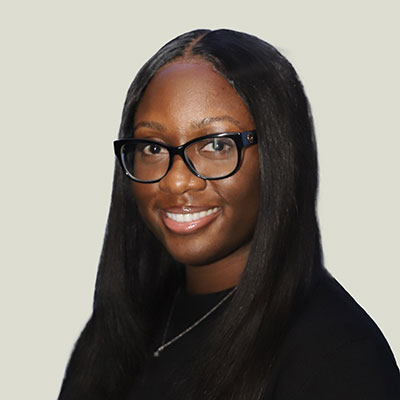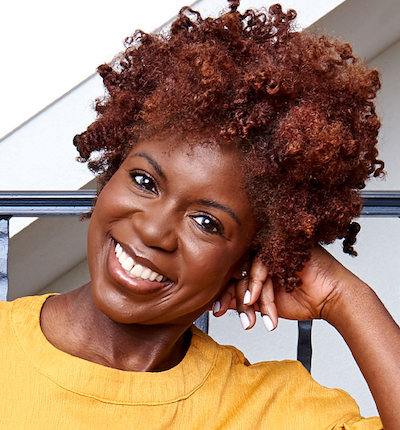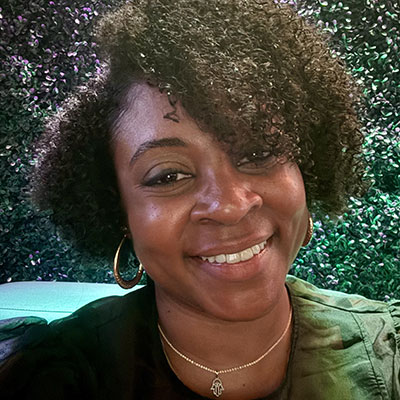Meet 8 Black Entertainment Marketers Making History Today
On Oprah, the Fly Girls and the question that should never be asked again
I’m a sucker for a good origin story, whether it’s presented in the form of a true crime podcast, an action film (like Casino Royale) or a documentary on Hulu. I can’t help comparing my “origins” to those stories and wondering what could have been, had I made a right turn instead of a left—could I too have been a princess fashion designer? Black History Month honors the triumphs, struggles and innovative cultural contributions of African Americans who often go unrecognized or unheard. I’m proud to present a group of inspiring creatives, via their origin stories, to celebrate their accomplishments and journeys in entertainment marketing.
Tunisia Wilson
FX Networks + Disney CreativeWorks Studio Creative Director, Branded Content
Recent project: Season 3 of The Bear
Where were you raised and who or what inspired you to seek a creative path?
I was born and raised in Brooklyn. I always had creative interests from childhood, like drawing and dancing, but one of the things that inspired me to seek a creative path in television was watching In Living Color with my family. I was enamored of the Fly Girls dancing and my culture being represented through music and brilliant sketch comedy.
What makes you passionate about your work?
I am passionate about my work because I am passionate about storytelling. Textures, colors, different perspectives and clever writing hold such important roles in culture and society. To contribute to how those stories are told is an honor that I am so grateful for.
How important is diversity and inclusion in entertainment marketing?
Diversity and inclusion in entertainment marketing is paramount. Not only should there be a standardized D&I expectation in TV & Film—as it is our job to accurately represent the landscape of our country in 2024—but diversity and inclusion strategies should be led by BIPOC leaders throughout the industry to set that standard. That would require there to be BIPOC leaders in every organization, at every level and in every department. Secluding D&I execs from the operational functions of a company prevents D&I strategies from being incorporated in the business at large.
Ebony Coles
AMC Networks Creative Director, Copy
Projects I’m most proud of: NBC Peacock Knows Comedy, Better Call Saul FYC, Campaign Diversity Training Short Film
Where were you raised and who or what inspired you to seek a creative path?
Being raised in Brooklyn had everything to do with my creative path. I was immersed in this incredible mecca of different cultures that influenced how I saw the world. From fashion to festivals, New York streets are a visual masterpiece. Brooklyn is also a tough place to live. Everyone has a creative hustle because it’s the only way to survive. With this upbringing, being creative became who I was, who I am, and what I need. Choosing another path was never an option.
What makes you passionate about your work?
I’ve always loved writing and I’m weirdly obsessed with marketing. When I moved to Los Angeles, I thought I had to choose one over the other. There is a writing career or a marketing career, right? No! I found a way to pursue both passions in marketing. I’m intrigued with creating messaging for outside-the-box campaigns. In this era of entertainment, there’s no formula. Everyone’s trying to figure out what’s next. I want to be a part of “what’s next,” something new, innovative, fresh and different. The passion for what’s to come excites me.
How important is diversity and inclusion in entertainment marketing?
I’ll be glad when this question is never asked again. It’s absurd to explain why diversity and inclusion is vital when marketing to a global audience. If companies still need this to be explained, it’s not because they don’t get it, but because they don’t want to. I can’t wait until diversity and inclusion is not treated as this separate entity, and we realize it should be in the DNA of every department and the foundation of every company.
Louise Cousins
Hulu Head of Creative Marketing Onyx Collective
Recent Projects: The 1619 Project campaign, The Drive With Swizz Beatz, Unprisoned
Where were you raised and who or what inspired you to seek a creative path?
I was born and raised in London. As a young person, I was heavily influenced by African American cinema. It was one of the few places I saw Black characters onscreen. In Spike Lee’s Do the Right Thing, Mo Better Blues and She’s Gotta Have It, I saw beautifully shot, 3-dimensional characters in relatable settings. This inspired me to study film and TV and work in the entertainment industry.
What makes you passionate about your work?
Collaborating with new talent keeps me passionate. Whether it’s working with a new photographer, designer, director, editor, or in front-of-the-screen talent, they all have a unique way of approaching a project that can be unexpected, fun and highly creative.
How important is diversity and inclusion in entertainment marketing?
Diversity, inclusion and equity are paramount in the growth of every business. If you are marketing to the world, you need to understand audiences and culture and there is no better way than leaning in and listening to those voices.
Mahlon Rhodes
Greenlight Creative Designer
Recent projects: Paramount+ Super Bowl Sweepstakes, HBO Smartless, Neon Rated’s Seeking Mavis Beacon
Where were you raised and who or what inspired you to seek a creative path?
I was raised in Cleveland. My earliest artistic inspiration was my mom. When I was a little kid, my mom attended the Cleveland Institute of Art. I used to tag along with her to classes. The Cleveland Museum of Art was right around the corner, and I knew it like the back of my hand. I thought art was really cool from an early age and wanted to be a part of it.
What makes you passionate about your work?
I basically want my headstone to read: “Here lies a cool dude, he made even cooler stuff.” What we contribute through our creativity becomes part of the legacy we leave behind. It can stand for what you’ve accomplished, and it can help another creative on their path. That legacy is what drives me and keeps me passionate about creating.
How important is diversity and inclusion in entertainment marketing?
Diversity and inclusion allow for a diversity of ideas and a holistic approach to creative problem solving. Without diversity, we lock ourselves into an echo chamber, and the results might not reflect the audiences we hope to engage. We live in a society in which there are so many tastes, lifestyles and perspectives that evolve and change with time. It’s crucial for us to connect outside of like-minded experiences to effectively communicate to a broader audience.
Joy Cloyd
Searchlight Pictures Creative Advertising, Print & Digital
Passion project: HBO Max—Sweet Life: Los Angeles,
Recent project: Searching for Soulfood—Onyx Collective/Hulu
Personal project: current/ongoing project—Date IRL
Where were you raised and who or what inspired you to seek a creative path?
I was raised and still live in Los Angeles. My creativity piques when I am marveling at the world around me, and L.A. always inspires—whether at the beach or my backyard. I think God has given me this gift, and sometimes a curse, of wandering. And I have been given amazing opportunities to do so in entertainment, where I can let my creativity flow. I have found creative marketing to be a place where you’re encouraged to think outside of the box, and to have that freedom to explore and question inspires me endlessly. I constantly seek opportunities to learn, try things out and celebrate the wins and losses.
What makes you passionate about your work?
People. The more I can connect with people, the more I feel like I am tapping into my purpose. Through my newest venture, Date IRL, I have been able to connect with a wide range of people and communities. The more I work on passion projects, the more I learn about myself and feel connected to my purpose. Creating something out of nothing is so rewarding, exhausting, fun, time-consuming and always a part of my everyday conversations—but that’s how I know it’s passion and I absolutely love it.
How important is diversity and inclusion in entertainment marketing?
In my experience growing up in South L.A., I never felt a lack of representation or diversity, and it wasn’t until I started working on one show about my community that I felt this unique attachment and ownership. I wanted to be in every room, look at every deck and insert myself into everyone else’s team. Eventually, I experienced burnout and knew that I should not carry all that weight. As the only one on the team who could relate to the stories, I fought for and against creative, and it made me realize how important diversity on a marketing team is if we want to continue to have diverse stories. Representation needs to exist at every stage of a campaign, otherwise the message in might be lost during delivery.
Imani Thomas
Amazon MGM Studios Global Brand Partnerships
Recent Campaigns: Tune In & Takeout with Prime Video and Grubhub, Amazon Original Series Harlem celebrates hair with Mielle Organics
Where were you raised and who or what inspired you to seek a creative path?
Growing up in South L.A. inspired me to take on a creative path. I explored different creative avenues and activities from the arts to sports and various young adult programs. Each opportunity allowed me to develop different parts of myself. I found that my journey was not restricted to the linear tropes typically displayed in media, but embodied a melting pot of experiences.
What makes you passionate about your work?
The marketing landscape is constantly evolving, and the ability to innovate and take risks allows me to be creative and strategic. Coming up with new ideas and constantly putting myself in a position to learn new concepts challenges me to do more. Within this industry, I’m able to combine my own experiences with those of my peers and turn them into campaigns that resonate. I’m passionate about creating marketing that is authentic and meaningful and connects with people on a personal level.
How important is diversity and inclusion in entertainment marketing?
From a Black woman’s perspective in the streaming industry, the importance of diversity and inclusion is centered around representation. It’s about dismantling harmful stereotypes and creating a space where everyone can see themselves, be heard authentically and feel valued for who they are. This starts with diverse teams, where unique experiences and perspectives weave together, sparking innovative ideas and meaningful campaigns. It’s about authentic representation that builds trust and emotional connections with audiences. Diverse voices offer fresh perspectives that broaden our understanding of the world, and entertainment marketing has the ability to shape our reality and unlock a more inclusive society where all stories can be told.
Suzette Edwards
The Jennifer Hudson Show / The Ellen Degeneres Show / 20th Television Marketing Director
Recent projects: launching The Jennifer Hudson show while simultaneously closing out the last season of the 19 seasons of The Ellen Degeneres show.
Where were you raised and who or what inspired you to seek a creative path?
I was raised in Boston by my Caribbean parents. There were so many things that played a part in my creative path. My parents for one. They own a formal wear store, and as young child I would help out. I learned to greet and measure customers, along with helping put the suit orders together. My mom was a florist, and that required me to get up early to go the market to help fill orders. It was incredible to take in all the different flowers and smells and turn them into beautiful arrangement for all occasions! My other inspirations were women I saw on television like Oprah, Debbie Allen and the first Black woman anchor to do the evening news in Boston. I remember it so vividly, because there was so much coverage about her. I wasn’t allowed to watch a lot of television, but seeing a woman who looked like me hosting a show really piqued my interest. I had a love for television, but also interior design and cosmetology, so there was a thread of creativity that lead me down different paths but ultimately into broadcast television.
What makes you passionate about your work?
People. I enjoy connecting with others. I love the process of a project coming together and how each department collectively brings it to life. I have always been intrigued about television but I had no clue how it was created or what it entailed. The moment I got the opportunity to work in the business, I learned there are so many moving parts, and they move quickly—for me that’s the exciting part!
How important is diversity and inclusion in entertainment marketing?
Everyone should see themselves and feel included in all aspects of marketing. We’ve seen some changes in the business, but there is still a lot of work to be done. Not just one group has a story. Our world is a melting pot of so many beautiful cultures, and marketing should reflect that.
Courtney Snead
Paramount+ Senior Manager Campaign Project Management
Recent project: The Tiger’s Apprentice.
Where were you raised and who or what inspired you to seek a creative path?
I was raised in Brooklyn. Growing up, my dad and I would watch Saturday morning cartoons and I was always fascinated by the commercials. Whether it was for a new toy, an upcoming movie or a sugary breakfast cereal, the spots intrigued me and I knew that was what I wanted to do in my career.
What makes you passionate about your work?
Finding organization and order in the sometimes chaotic creative process is what I’m most passionate about. It takes a lot of talent and resources to make marketing go live. Making those plans come together brings me great joy and satisfaction.
How important is diversity and inclusion in entertainment marketing?
Diversity and inclusion should be a top priority for all industries. In entertainment, it is especially important that marketers have the backgrounds, skillsets and interpersonal connectivity to relate to their audiences. The demographic of America and the world as a whole is rapidly changing. The inclusion of women and BIPOC individuals at all levels and all career stages is becoming more important. People (viewers, listeners, subscribers, consumers) want content that they can identify with. They want to know that it is coming from a place of understanding and intentionality, rather than just someone checking a box to recognize a month or a historical figure. It’s important to offer diverse talent a seat at the table to help influence decisions in a way that works for everyone, not just the people on top. There have been great strides made in diversity, inclusion and equity, but there are glaring signs that show us we have a long journey ahead.



 Events
Events